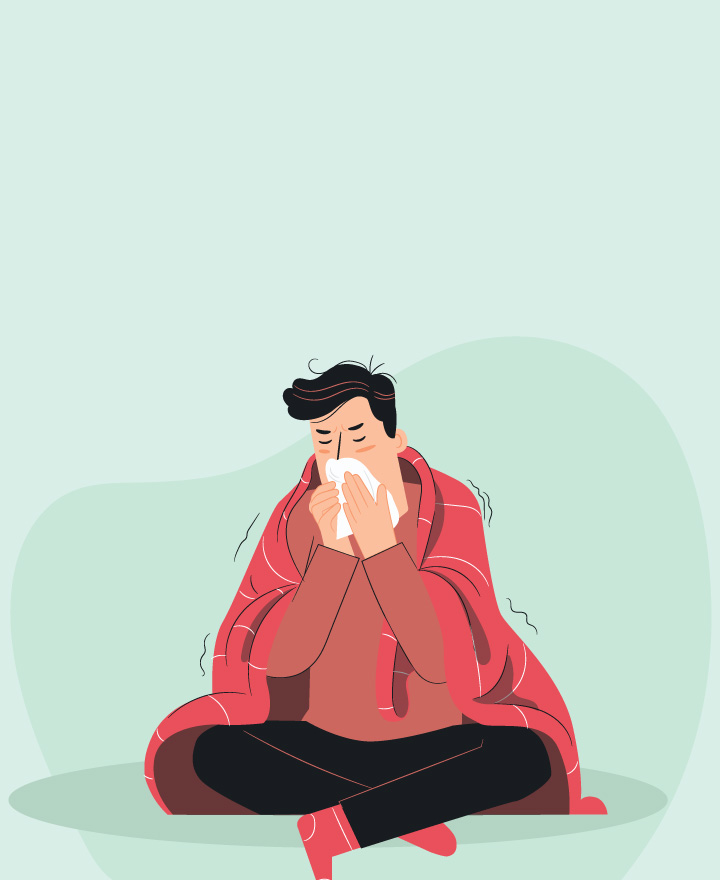

Type A Influenza: Symptoms, Treatment, and Prevention
Influenza type A is a virus that spreads easily and can make people really sick, especially those who are older, kids, or anyone with a weak immune system. Imagine it like a bad cold that can hit harder for some people. Recognising the early signs of influenza Type A is crucial for managing the illness and preventing it from worsening. Take a look at this article to learn about influenza Type A symptoms, treatment, and necessary preventive measures one can take to stay healthy.
Symptoms: Key Indicators
The early signs of influenza type A can sometimes feel like a common cold, but the symptoms tend to come on quickly and are often more intense. Some primary symptoms of influenza type A include —
• A sudden high fever
• Headaches
• Sore throat
• Persistent cough
• A runny or blocked nose
• Aching muscles and overall tiredness
In some cases, you might also feel nauseous or vomit. Recognising influenza type A symptoms early is the key to manage the ailment and recover faster.
How It's Diagnosed?
To diagnose influenza type A, the doctor will ask you about your symptoms and how long you’ve been feeling unwell. Before starting the influenza type A treatment, he/she will want to know details about your cough, fever, and any other signs you’re experiencing. Your doctor will opt for the following —
1. Physical Examination:
The doctor will examine you to check for common flu symptoms, such as a fever or a sore throat and check your breathing using a stethoscope.
2. Rapid Flu Test:
Often, a quick flu test is used to confirm if you have influenza type A. This involves taking a swab from your nose or throat to collect a sample.
3. Sample Testing:
The sample is tested to see if the flu virus is present in the respiratory system. This helps in confirming the diagnosis quickly.
Diagnosing the flu early is important as it allows for effective management of the illness and helps prevent it from spreading to others.
Treatment: Medications and Home Care
This includes:
• Antiviral Medications
Your doctor might prescribe antiviral drugs as they can help reduce the severity of the ailment. These are best taken within 48 hours of noticing symptoms.
• Rest and Fluids
Getting plenty of rest and drinking lots of fluids can help most people recover from the flu. Adequate intake of fluids helps your body stay hydrated and fight the virus.
• Over-the-counter Remedies
You can use OTC medications to help ease symptoms like a sore throat, cough, or fever. These won’t cure the flu, but they can make you feel more comfortable.
• Stay Home
It’s crucial to stay at home if you’re sick. Avoid going to work, school, or public places to prevent spreading the virus to others.
• Keep Your Distance
During your recovery, try to keep a safe distance from other people in your household. This helps reduce the risk of passing the flu on to them.
Prevention: Vaccination and Hygiene Tips
The best way to protect yourself from influenza type A is by getting vaccinated every year. The flu vaccine can make any symptoms less severe. Along with vaccination, simple hygiene practices can go a long way in prevention, such as —
• Wash hands with soap and water regularly.
• Use a hand sanitiser when soap is not available.
• You must cover your mouth and nose when sneezing or coughing.
• Avoid close contact with sick people.
These practices can help reduce the spread of influenza type A and protect both you and those around you.
Conclusion
Influenza type A is a virus that easily passes from one person to another, especially among those who are more at risk. That's why it's so important to know the influenza type A symptoms and get the right influenza type A treatment early for a quicker recovery.
One of the important components of our overall wellness is also being financially secured. Healthcare emergencies can happen any time, but a good health insurance policy can protect you from such uncertain situations. To know more about Wellness and other health related tips, visit the wellness corner.
Source: who.int, webmd, hopkinsmedicine, niaid.nih.gov, mayoclinichealthsystem
Disclaimer: This blog provides general information and discussions about health and related subjects. The information and other content provided in this blog, website or in any linked materials are not intended and should not be considered, or used as a substitute for, medical advice, diagnosis or treatment. Kindly contact your Doctor before starting a new medicine or health regime.
Related Articles
Cold and Flu Remedies- Herbs To Keep Your Cold In Check
Flu Symptoms - Recognizing the Signs
Bronchitis - Symptoms, Causes, Treatment & Prevention
The Best Ways to Prevent Infections
Meningitis - Symptoms, Causes & Treatment
Published on November 29, 2024


 Health Insurance
Health Insurance  Travel Insurance
Travel Insurance  Car Insurance
Car Insurance  Cyber Insurance
Cyber Insurance  Critical Illness Insurance
Critical Illness Insurance
 Pet Insurance
Pet Insurance
 Bike/Two Wheeler Insurance
Bike/Two Wheeler Insurance  Home Insurance
Home Insurance  Third Party Vehicle Ins.
Third Party Vehicle Ins.  Tractor Insurance
Tractor Insurance  Goods Carrying Vehicle Ins.
Goods Carrying Vehicle Ins.  Passenger Carrying Vehicle Ins.
Passenger Carrying Vehicle Ins.  Compulsory Personal Accident Insurance
Compulsory Personal Accident Insurance  Travel Insurance
Travel Insurance  Rural
Rural